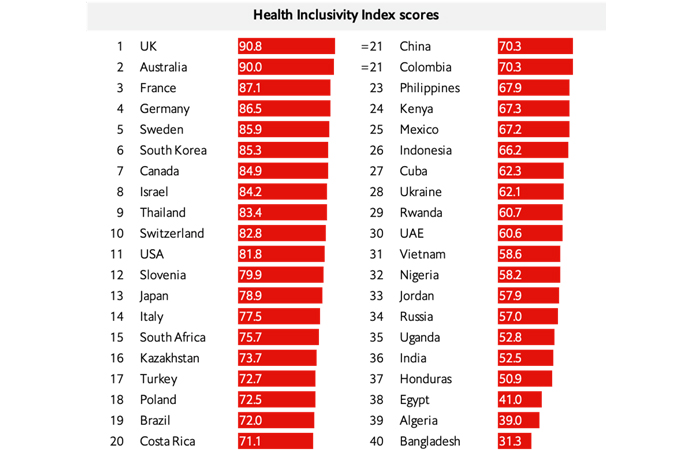Latest

UK has most inclusive approach to healthcare, according to new Index
In Latest
Bookmark
Record learning outcomes
Those living in countries that prioritise health inclusivity are more likely to live healthy lives for longer, according to a world-first global study.
The Global Health Inclusivity Index, launched by Haleon (formerly GSK’s consumer health business), benchmarked 40 countries on the presence, coverage and effectiveness of inclusive healthcare systems, process and policies.
The key findings depicted on the on the graph below indicate the health inclusivity index scores. The UK was found to have the most inclusive approach to healthcare, followed by Australia, France, Germany and Sweden. The lowest scoring countries for health inclusivity were India, Honduras, Egypt, Algeria and Bangladesh.
Some eight out of 10 top ranking countries achieved their highest scores for the ‘People and Community Empowerment’ metric “where the presence of initiatives like health literacy programmes and community outreach enable people to proactively manage their own health”, said Haleon. Nine out of the 12 countries that ranked highest for health inclusivity where also find to have the highest for healthy life expectancy which “suggests an inclusionary approach to healthcare may lead to people spending a greater proportion of their lives in good health”, added Haleon.
Haleon has hopes that policymakers are alerted to the critical role health inclusivity has to play as many countries continue to face a “spiralling challenge” of health failing to keep pace with ever increasing life expectancy. As a result of which, people continue to live in poorer health for longer percentages of their lives “piling more pressure on overburdened healthcare systems”.
“Countries that create the most inclusive healthcare systems in the world are those that empower their citizens to be in control of their own health – through education, tools and services,” said Haleon. “The study has shown that a country’s wealth and expenditure on health does not necessarily mean greater health inclusivity.”
“Everyone should have the opportunity to live in good health, but millions of people continue to face barriers. The inaugural Health Inclusivity Index highlights the barriers which lead to the vulnerable and marginalised being held back from and less included in opportunities for better everyday health,” said Brian McNamara, chief executive officer, Haleon.
But this is just the start, Mr McNamara explained. “We are also collaborating with industry, government, academia and other healthcare stakeholders to improve health inclusivity. This work is part of our commitment to empower millions of people a year to be more included in opportunities for better everyday health, empowering 50 million a year by 2025.”

